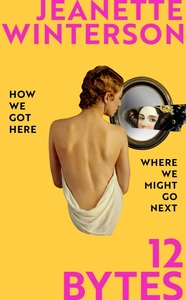Take a photo of a barcode or cover
“No one, at the end of life, regrets love.”
Having read some less than enthusiastic reviews of this book on Goodreads, I was nervous about starting this book. I needn’t have been. Winterson writes with the same beautiful prose that we’ve come to expect, offering reflections on what it means to be human in the age of AI. It’s not a science book, nor does it purport to be. Like her fiction, it’s a distinctly _human_ book that weaves throughout it an interesting facts and opinions, succinctly capturing her intense curiosity about the world we find ourselves in and what might come next. Consider this book a jumping off point for deeper research and reflection, if you want to. It’s an enjoyable few hours in the company of a bright and engaging writer.
Having read some less than enthusiastic reviews of this book on Goodreads, I was nervous about starting this book. I needn’t have been. Winterson writes with the same beautiful prose that we’ve come to expect, offering reflections on what it means to be human in the age of AI. It’s not a science book, nor does it purport to be. Like her fiction, it’s a distinctly _human_ book that weaves throughout it an interesting facts and opinions, succinctly capturing her intense curiosity about the world we find ourselves in and what might come next. Consider this book a jumping off point for deeper research and reflection, if you want to. It’s an enjoyable few hours in the company of a bright and engaging writer.
3,5* rounded to 4
I think I could love Jeanette Winterson shopping list but I found a bit hard to keep reading this series of essay on AI and feminism.
Her style of writing is as good as always but the content is a bit disjointed and sometimes I found it confusing.
Some interesting food for thought.
Many thanks to the publisher and Netgalley for this ARC, all opinions are mine
I think I could love Jeanette Winterson shopping list but I found a bit hard to keep reading this series of essay on AI and feminism.
Her style of writing is as good as always but the content is a bit disjointed and sometimes I found it confusing.
Some interesting food for thought.
Many thanks to the publisher and Netgalley for this ARC, all opinions are mine
reflective
slow-paced
inspiring
reflective
tense
fast-paced
hopeful
informative
inspiring
reflective
fast-paced
informative
reflective
medium-paced
A collection of essays on the history of technology and some future speculation, threaded with feminist concepts. I particularly liked the one that focused on sex dolls and their inherent Stepford Wives vibe, as well as how their proliferation is likely to lead to increased harm to women because the doll acts as a training tool to numb men to the idea of certain acts.
adventurous
challenging
funny
hopeful
informative
inspiring
reflective
slow-paced
funny
reflective
medium-paced
I was disappointed with this one. Jeanette Winterson is one of my favourite novelists, but this essay collection was not it for me.
Maybe it's because I work in technology and have more exposure to these ideas than the average reader, but the book felt very surface-level to me. Each essay covers a range of points and half-formed ideas that skim the surface of the Big Questions of AI and robotics but don't feel backed up by a particularly robust understanding of the technologies involved. It feels a bit like a student of philosophy reaching for meaningfulness by juxtaposing various modern, historical or theoretical concepts or events and then just pointing at them.
Winterson's writing is, as always, enjoyable to read but I was left wanting a lot more from this book. There is much better work being done by AI ethicists in this field than is reflected in the writing here.
Maybe it's because I work in technology and have more exposure to these ideas than the average reader, but the book felt very surface-level to me. Each essay covers a range of points and half-formed ideas that skim the surface of the Big Questions of AI and robotics but don't feel backed up by a particularly robust understanding of the technologies involved. It feels a bit like a student of philosophy reaching for meaningfulness by juxtaposing various modern, historical or theoretical concepts or events and then just pointing at them.
Winterson's writing is, as always, enjoyable to read but I was left wanting a lot more from this book. There is much better work being done by AI ethicists in this field than is reflected in the writing here.
Mostly great. Winterson is one of my favorite authors ever. I literally wrote my senior thesis about her. I loved learning about the dawn of computer science, the gender disparities still happening today, and the possibilities for AI technologies. However, I have trouble not rolling my eyes at this ubiquitous idea that robots are going to take over and kill us. It's not just Winterson. But I nearly had to quit the book. Glad I kept reading, since each essay handles a different topic. Would recommend, but take with a grain of salt.
Is death nothing more than a minor “metabolic challenge”? Will transhumanism be the next “mixed race”? Can humans reasonably expect to create a faultless AI when what’s fundamentally faulty may be us? If you define a person as “simply a place where something happens” and suspect that “the future will not be merely an extension of the present,” check out the essay collection 12 Bytes by prodigious speculative fiction writer Jeanette Winterson. Shift the discussion from whether computers possess souls to whether we do, examine the extent to which “behavior that can be predicted can be manipulated” and the implications thereof, and consider how quickly an open door closes, as well as what it shuts out. Historically, Winterson reminds us, we’ve “read the headstones and wondered at the weeping angels, knowing that our turn will come.” Now we ask, “But will it?”







